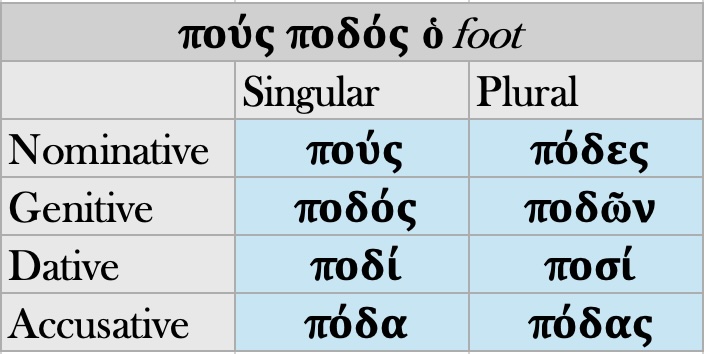7.18 For most Greek verbs, RECESSIVE ACCENTUATION determines which syllable receives the accent. In the case of most Greek nouns (and adjectives), PERSISTENT ACCENTUATION determines which syllable receives the accent.
The NOMINATIVE SINGULAR of each noun has a particular vowel or diphthong that receives the ACCENT. Where this accented vowel or diphthong is found – antepenult, penult, or ultima – is a matter of spelling, and must be memorized. For example, note that the accent is “born” on the alpha of ἄρχων, but on the omega of ἡγεμών. As a general principle, the accent on all the other INFLECTED forms of a noun tries to remain, or PERSIST, on the same vowel or diphthong on which it is found in the nominative singular, unless forced to change position or accent type (e.g., from circumflex to acute).
Note that the 3rd declension case ending for the nominative singular adds only a consonant (-ς) to the noun stem; the remaining case endings add ANOTHER SYLLABLE to the noun. In practice, this means that if the accented vowel or diphthong is found, say, in the ultima of the nominative singular form, the same vowel or diphthong becomes the penult in the remaining inflected forms.
There are three general PERSISTENT ACCENT situations or rules that apply to nouns of the third declension.
7.19 When the accent falls on the PENULT of inflected forms…
It stays there. If the penult is LONG, the accent is a circumflex with short ultima, acute with long ultima.
7.20 If the penult is SHORT, the accent remains acute throughout all forms.
Note that the rule for accents that fall on the penult is IDENTICAL to that of VERBS with only TWO SYLLABLES!
7.21 When the accent is on the ANTEPENULT of inflected forms…
Remember that the accent on an antepenult can only be acute. If the ULTIMA becomes LONG (e.g., genitive plural –ων), the accent moves to the PENULT, and remains acute.
Note that the rule for accents that fall on the antepenult is IDENTICAL to that of VERBS with THREE OR MORE SYLLABLES!
7.22 When the accent falls on a MONOSYLLABIC nominative singular noun…
The accent usually moves to the ULTIMA of the genitive and dative cases, singular and plural. In these situations, the accent on the ultima is ACUTE over short vowels (e.g. –ός), and circumflex over long (e.g. –ῶν). This accent pattern is irregular and must be memorized.
- Read more
-
There are a handful of monosyllabic nouns that instead accent the penult of the genitive plural (S 252a). The most common ones are παῖς, παιδός ὁ, ἡ child (genitive plural = παίδων), declined above, φῶς, φωτός ἡ light (genitive plural = φώτων), and οὖς, ὠτός τό ear (genitive plural = ὤτων). These last two nouns are introduced in the next lesson.





